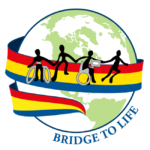Due to COVID-19, the TIR program is on hold until further notice.
Application and Review
Application Documents
Eligible candidates must submit the following required documents for review by The Bridge School selection committee.
1. Completed application form
2. A 300-500 word essay detailing:
- What motivated you to apply for this type of learning experience given that it will require a major personal and professional commitment on your part
- How you would disseminate the information and skills you learn during your residency in your country and region upon return (please be very specific)
- What support you can expect from employers, the government, colleagues and universities upon your return to your country to disseminate the information and skills you will learn (provide details with names and positions)
- What you can share from your country/culture/educational program with the Bridge School staff, students and families
3. Letter of reference from 2 individuals familiar with your professional work. The letters should support your potential to benefit from this experience and to make an impact on individuals with severe physical and language communication impairments (complex communication needs)
4. Letters from 2 professionals in your country who will assist you in designing and implementing a dissemination plan upon your return home
Application Review
Once an application has been received, the applicant will receive a letter of confirmation of receipt. All completed applications received prior to the submission deadline will be reviewed and ranked by the selection committee. Finalists for the Teacher in Residence program will be notified and a teleconference interview scheduled.
Teleconference Interview
Members of the selection committee will conduct the teleconference interview.
Interview Process and Sample Questions [PDF, 1.1MB]
Reference Checks
Finalists for the Teacher in Residence program will be notified and informed that the selection committee will be contacting the references they provided on their application forms. References will be asked:
- to verify their professional relationship with the applicant
- to identify applicant’s professional strengths
- to provide information regarding their professional opinion as to the applicant’s potential to complete the residency and disseminate the information when they return to their home country
Notification of Final Selection
The selection committee will review material from all finalists and determine the best fit for the Teacher in Residence program. The candidate selected for the award will be contacted as to the decision and all applicants will be notified as to the selection of the Teacher in Residence. The announcement will be posted on The Bridge School website.
Department of Homeland Security (DHS) Documentation
The Teacher in Residence must be granted an H3-B Visa from the Department of Homeland Security in order to reside in the United States for the duration of the award and to receive a stipend from The Bridge School. This process may take up to 4 months from start to completion and will be started immediately upon the selection of the finalist. The Director of Outreach and Technology will contact the finalist and provide a detailed list of documentation required to apply for the visa. This includes, but is not limited to the following:
- personal information (information contained on passport, copies of diplomas/certificates/licenses, verification of employment)
- two letters from experts in home country that attest to the lack of available training in assistive technology and augmentative and alternative communication
- letter verifying that candidate is assured of employment upon return
Once the visa has been approved, the DHS will send a copy to the embassy/consulate in the Teacher in Residence’s country and will notify The Bridge School that the visa has been approved. The Teacher in Residence will be notified to go to the designated site to retrieve the visa, submit to an interview and secure the appropriate paperwork to exit their home country and enter the United States.


